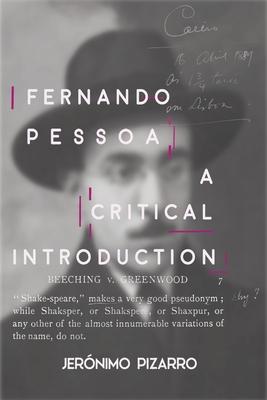A Critical Introduction proposes a new didactic and dynamic way of reading the great twentieth-century poet Fernando Pessoa (1888-1935). The aim is to present a holistic vision of this complex poet, promoting his literary geniality in order to better understand his orthonymic-heteronymic poetry. A guiding motif is Pessoa’s own Be as plural as the universe. In leading the reader through the poet’s published literary work, Jerónimo Pizarro allows an intimate perspective, alongside an academic one, to better understand the workings of Pessoa’s mind and life. Discussion centres on the dilemmas an editor faces when editing posthumously. A prime question revolves around the genesis of Pessoa’s heteronyms and orthonyms. Understanding is revealed by a critical perspective on the unity that exists in all of Pessoa’s literary work. Interpretations of the poems; explanation of the profundity of The Book of Disquiet; and his isms of Paulism, Caeirism, Intersectionism and Cessationism, are discussed and analysed. The issue of Pessoa’s astrological predictions his birth year and the effects of this event on Portuguese national history is debated. A chapter is devoted to the effect that translating Omar Khayyám’s Rubáiyát had on the poet. The work contains eleven texts written by Pessoa in English (including an autobiographical note from 1935), a substantive dual language bibliography, and is highly illustrated with facsimiles of the poet’s own written material. A Critical Introduction is essential reading for all scholars and students of Pessoa’s literary output and life circumstances. The work has been written to appeal to cultural studies (arts and aesthetics) enthusiasts in general at both undergraduate and postgraduate level, but given the engagement of new critical material it also provides a structured resource for future research.
| FindBook |
有 1 項符合
Fernando Pessoa: A Critical Introduction的圖書 |
 |
Fernando Pessoa: A Critical Introduction 作者:Pizarro 出版社:Sussex Academic Press 出版日期:2021-08-22 語言:英文 規格:平裝 / 256頁 / 普通級/ 初版 |
| 圖書館借閱 |
| 國家圖書館 | 全國圖書書目資訊網 | 國立公共資訊圖書館 | 電子書服務平台 | MetaCat 跨館整合查詢 |
| 臺北市立圖書館 | 新北市立圖書館 | 基隆市公共圖書館 | 桃園市立圖書館 | 新竹縣公共圖書館 |
| 苗栗縣立圖書館 | 臺中市立圖書館 | 彰化縣公共圖書館 | 南投縣文化局 | 雲林縣公共圖書館 |
| 嘉義縣圖書館 | 臺南市立圖書館 | 高雄市立圖書館 | 屏東縣公共圖書館 | 宜蘭縣公共圖書館 |
| 花蓮縣文化局 | 臺東縣文化處 |
|
|
圖書介紹 - 資料來源:博客來 評分:
圖書名稱:Fernando Pessoa: A Critical Introduction
內容簡介
作者簡介
Dr. Jerónimo Pizarro, Professor at Universidad de los Andes, holder of the chair of Portuguese Studies of the Camões Institute in Colombia and winner of the Eduardo Lourenço Award (2013), is responsible for most of the new editions and new series of texts by Fernando Pessoa published in Portugal since 2006. He is also a critic, a translator and the editor-in-chief of the journal Pessoa Plural - A Journal of Fernando Pessoa Studies.
Postcolonial Stylistics
Postcolonial Stylistics
Chaucer’s Ethical Philosophy
Potter Stinks: Gender and Species in J. K. Rowling’s Harry Potter Series
Potter Stinks: Gender and Species in J. K. Rowling’s Harry Potter Series
Conjuring the Haint: The Haunting Poetics of Black Women
Conjuring the Haint: The Haunting Poetics of Black Women
Migration Literature in Translation: From U.S. Latinx Texts to Transnational Readers
Emporialism: Department Store Fictions and the Politics of the Mediterranean
Freedom Is Not Enough: T. S. Eliot for Liberation, Resistance, and Hope
Postcolonial Stylistics
Chaucer’s Ethical Philosophy
Potter Stinks: Gender and Species in J. K. Rowling’s Harry Potter Series
Potter Stinks: Gender and Species in J. K. Rowling’s Harry Potter Series
Conjuring the Haint: The Haunting Poetics of Black Women
Conjuring the Haint: The Haunting Poetics of Black Women
Migration Literature in Translation: From U.S. Latinx Texts to Transnational Readers
Emporialism: Department Store Fictions and the Politics of the Mediterranean
Freedom Is Not Enough: T. S. Eliot for Liberation, Resistance, and Hope
|











